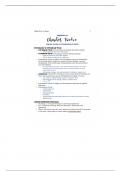Intermolecular - Study guides, Class notes & Summaries
Looking for the best study guides, study notes and summaries about Intermolecular? On this page you'll find 1603 study documents about Intermolecular.
Page 4 out of 1.603 results
Sort by
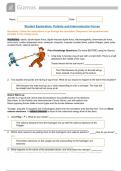
-
Gizmos Student Exploration Polarity and intermolecular Forces Questions with Correct Answers
- Exam (elaborations) • 4 pages • 2023
- Available in package deal
-
- $10.49
- + learn more
Directions: Follow the instructions to go through the simulation. Respond to the questions and prompts in the orange boxes. Vocabulary: dipole, dipole-dipole force, dipole-induced dipole force, electronegativity, intermolecular force, ionic bond, London dispersion force, molecule, nonpolar, nonpolar covalent bond, partial charges, polar, polar covalent bond, valence electron Prior Knowledge Questions (Do these BEFORE using the Gizmo.) 1. A big bully is having a tug-of-war with a small chil...
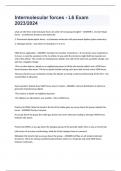
-
Intermolecular forces - L6 Exam 2023/2024
- Exam (elaborations) • 4 pages • 2023
-
- $7.99
- + learn more
Intermolecular forces - L6 Exam 2023/2024 what are the three intermolceular forces (in order of increasing strength)? - ANSWER-1. Van der Waals forces - act between all atoms and molecules 2. Permanent dipole-dipole forces - act between molecules with permanent dipoles (polar molecules) 3. Hydrogen bonds - only when H is bonded to F, O or N VDW forces application - ANSWER--Consider He (number of electrons = 2). He atoms move randomly & its two e-s could be anywhere in the 1s orbital. At ...
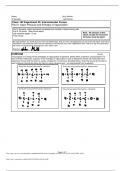
-
Chem 162 Experiment #3: Intermolecular Forces Part II: Vapor Pressure and Enthalpy of Vaporization - GRADED A+
- Exam (elaborations) • 7 pages • 2023
-
- $7.99
- + learn more
Chem 162 Experiment #3: Intermolecular Forces Part II: Vapor Pressure and Enthalpy of Vaporization PURPOSE (4 pts) The purpose is to measure the enthalpies of vaporazation of pentane, diethyl ether, butanone, and 2-butanol. For each of these molecules, a portion of the enthalpy of vaporization is due to dispersion forces (all molecules have dispersion forces) and the other to a polar component. In the boxes provided below, draw the structural formula for each molecule (should be drawn by h...

-
Honors Chemistry Unit 11 - Intermolecular Forces Study Guide with Complete Solutions
- Exam (elaborations) • 5 pages • 2024
- Available in package deal
-
- $9.99
- + learn more
Honors Chemistry Unit 11 - Intermolecular Forces Study Guide with Complete Solutions Forces between atoms in a compound are ______________ ______. - Answer️️ - intramolecular forces Forces that act between molecules are ______________ ______. - Answer️️ - intermolecular forces _____ _________ have very strong bonds (attractive forces) so they have high melting points and boiling points. - Answer️️ -ionic compounds ________ _________ have lower melting and boiling points beca...
This is a comprehensive and detailed note on Chapter 12; Liquid, solid and intermolecular forces for Chem 136. Quality stuff!! U'll need it!!
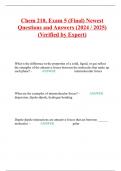
-
Chem 210, Exam 5 (Final) Newest Questions and Answers (2024 / 2025) (Verified by Expert)
- Exam (elaborations) • 23 pages • 2024
- Available in package deal
-
- $11.49
- + learn more
Chem 210, Exam 5 (Final) Newest Questions and Answers (2024 / 2025) (Verified by Expert) What is the difference in the properties of a solid, liquid, or gas reflect the strengths of the attractive forces between the molecules that make up each phase? - ANSWER intermolecular forces What are the examples of intermolecular forces? - ANSWER dispersion, dipole-dipole, hydrogen bonding

-
CHEM 162 EXPERIMENT #3: INTERMOLECULAR FORCES PART II (TAKE-HOME): VAPOR PRESSURE AND ENTHALPY OF VAPORIZATION UNIVERSITY OF WASHINGTON 2023 ACTUAL SOLUTION
- Exam (elaborations) • 7 pages • 2023
-
Available in package deal
-
- $13.89
- + learn more
CHEM 162 EXPERIMENT #3: INTERMOLECULAR FORCES PART II (TAKE-HOME): VAPOR PRESSURE AND ENTHALPY OF VAPORIZATION UNIVERSITY OF WASHINGTON 2023 ACTUAL SOLUTION
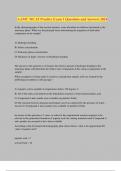
-
AAMC MCAT Practice Exam 1 Questions and Answers 2024
- Exam (elaborations) • 76 pages • 2024
- Available in package deal
-
- $14.49
- 1x sold
- + learn more
AAMC MCAT Practice Exam 1 Questions and Answers 2024 In the chromatography of the reaction mixture, water absorbed on cellulose functioned as the stationary phase. What was the principal factor determining the migration of individual components in the sample? A) Hydrogen bonding B) Solute concentration C) Stationary phase concentration D) Thickness of paper -Answer-A) Hydrogen bonding The answer to this question is A because the relative amount of hydrogen bonding to the stationary phas...
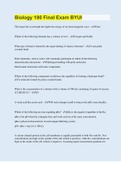
-
Biology 180 Final Exam BYUI | 70 Questions with 100% Correct Answers | Updated & Verified
- Exam (elaborations) • 8 pages • 2023
-
- $10.49
- 1x sold
- + learn more
The longer the wavelength the higher the energy of an electromagnetic wave - False Which of the following elements has a valence of two? - Oxygen and Sulfur What type of bond is formed by the equal sharing of valence electrons? - A non-polar covalent bond Polar molecules, such as water, will commonly participate in which of the following intermolecular interactions - Hydrogen bonding with polar molecules. Electrostatic interaction with ionic compounds. Which of the following compounds wou...

-
CHEM 162 EXPERIMENT # 1 REACTIVITY TRENDS, EXPERIMENT # 2: ELECTROCHEMISTRY, EXPERIMENT # 3: INTERMORECULAR FORCES (PART 1-IN-LAB), EXPERIMENT #3: INTERMOLECULAR FORCES PART II, Experiment #4 Part I. Fractional Crystallization of KNO3 with (NH4)2Fe(SO4)2
- Package deal • 6 items • 2023
-
- $25.39
- + learn more
CHEM 162 EXPERIMENT # 1 REACTIVITY TRENDS, EXPERIMENT # 2: ELECTROCHEMISTRY, EXPERIMENT # 3: INTERMORECULAR FORCES (PART 1-IN-LAB), EXPERIMENT #3: INTERMOLECULAR FORCES PART II, Experiment #4 Part I. Fractional Crystallization of KNO3 with (NH4)2Fe(SO4)2·6H2O Impurity Part II. Determining the Solubilty Curve of KNO3, EXPERIMENT # 5 SPECTROCHEMICAL

Study stress? For sellers on Stuvia, these are actually golden times. KA-CHING! Earn from your study resources too and start uploading now. Discover all about earning on Stuvia

